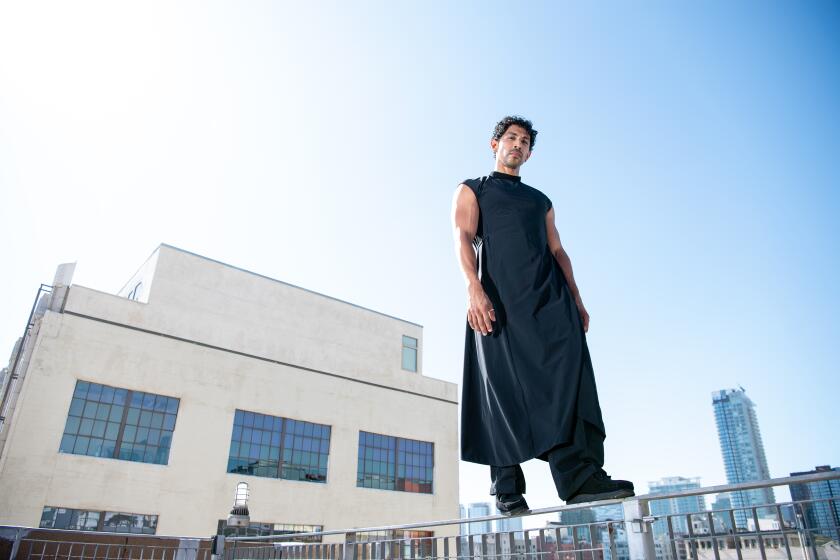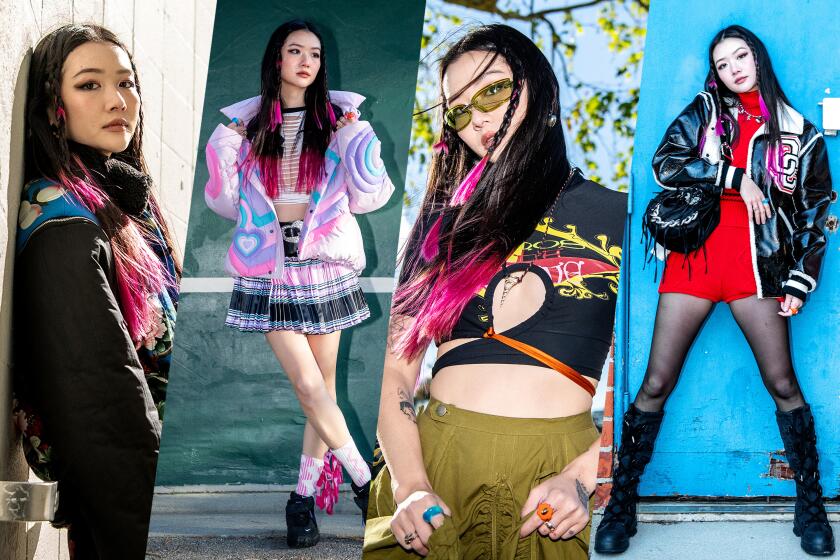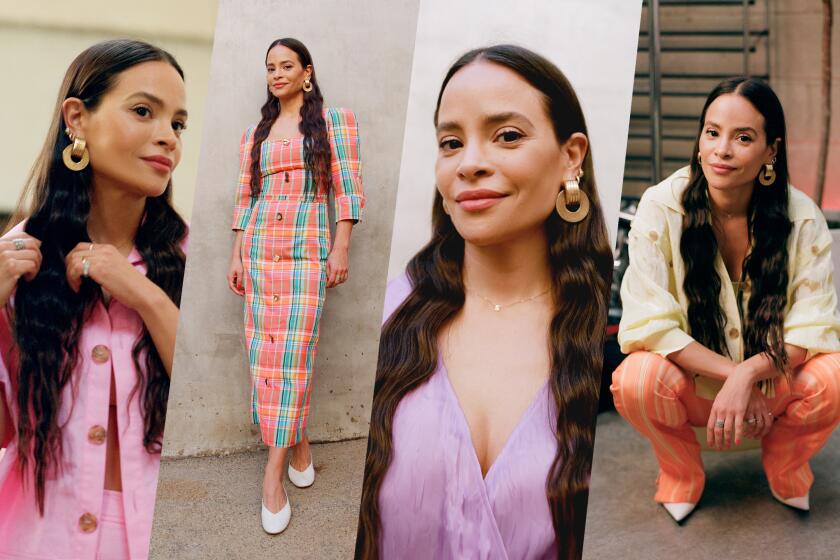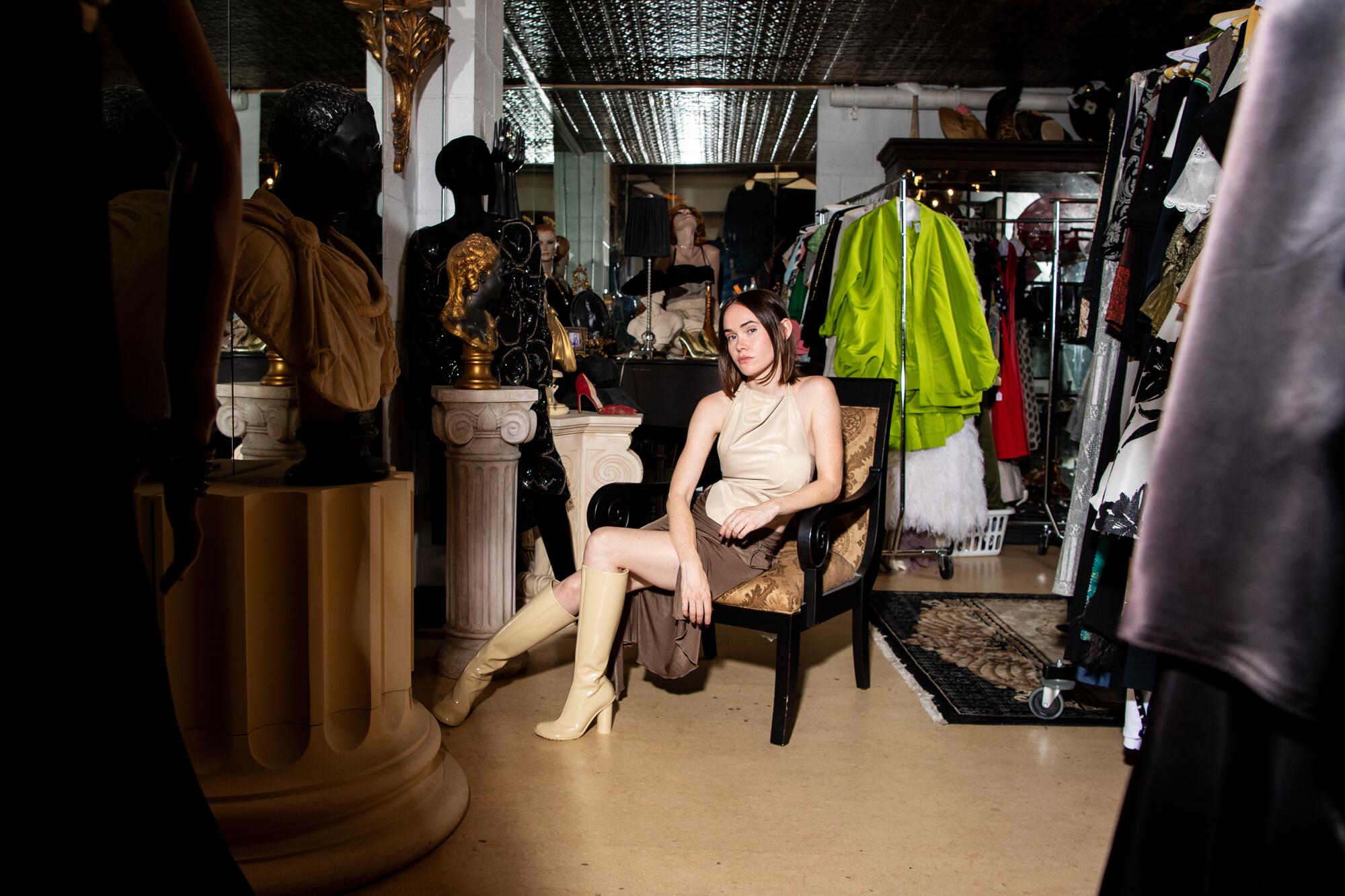
- Share via
For stylist Tess Herbert, the ideal backdrop to her personal style is Palace Costume — a vintage rental store nestled on Melrose Ave. where she spends most of her time when she’s in L.A. “It’s a magical labyrinth and it’s so weird and old school L.A.,” she says. “That’s my happy place — in the moth balls.”
Herbert’s chosen outfits embody the chic, draped silhouette she developed while living in London. “The [brands] I gravitated towards depended on whether their clothes made me feel confident or sexy or cool,” she explains. Adorning herself in her close friends’ brands, Nadine Moss and Selasi, along with vintage Japanese designers Issey Miyake, Junya Watanabe and Comme des Garçons, Herbert exhibits a subtle luxury.
From assisting for Vogue to working with Victor Barragán to designing clothes for indie short films, Herbert’s repertoire expands across artistic and editorial spaces — worlds which she has effortlessly straddled.
Style is having a point of view. Through his fits, the fashion visionary maps out a world of possibilities that can be found in just a few pieces.
Herbert, who grew up in Melbourne, Australia, studied textile history at New York University and worked at the Museum of the City of New York, where she worked under renowned costume curator Phyllis Magnuson researching and ensuring donated items were sufficiently steeped in NYC history. Herbert’s fashion history degree and self-described obsession with Renaissance history leaks through in our conversation of her love for numerology, tarot cards and human design — revealing her appreciation for archetypes and how they help her understand herself. In fact, if she’d had it her way, her dissertation would have covered clothing representations on tarot cards.
“Everyone’s expressing who they are through their dress, even if they’re not conscious of it,” Herbert says. “It’s a culmination of who you are as a human.”
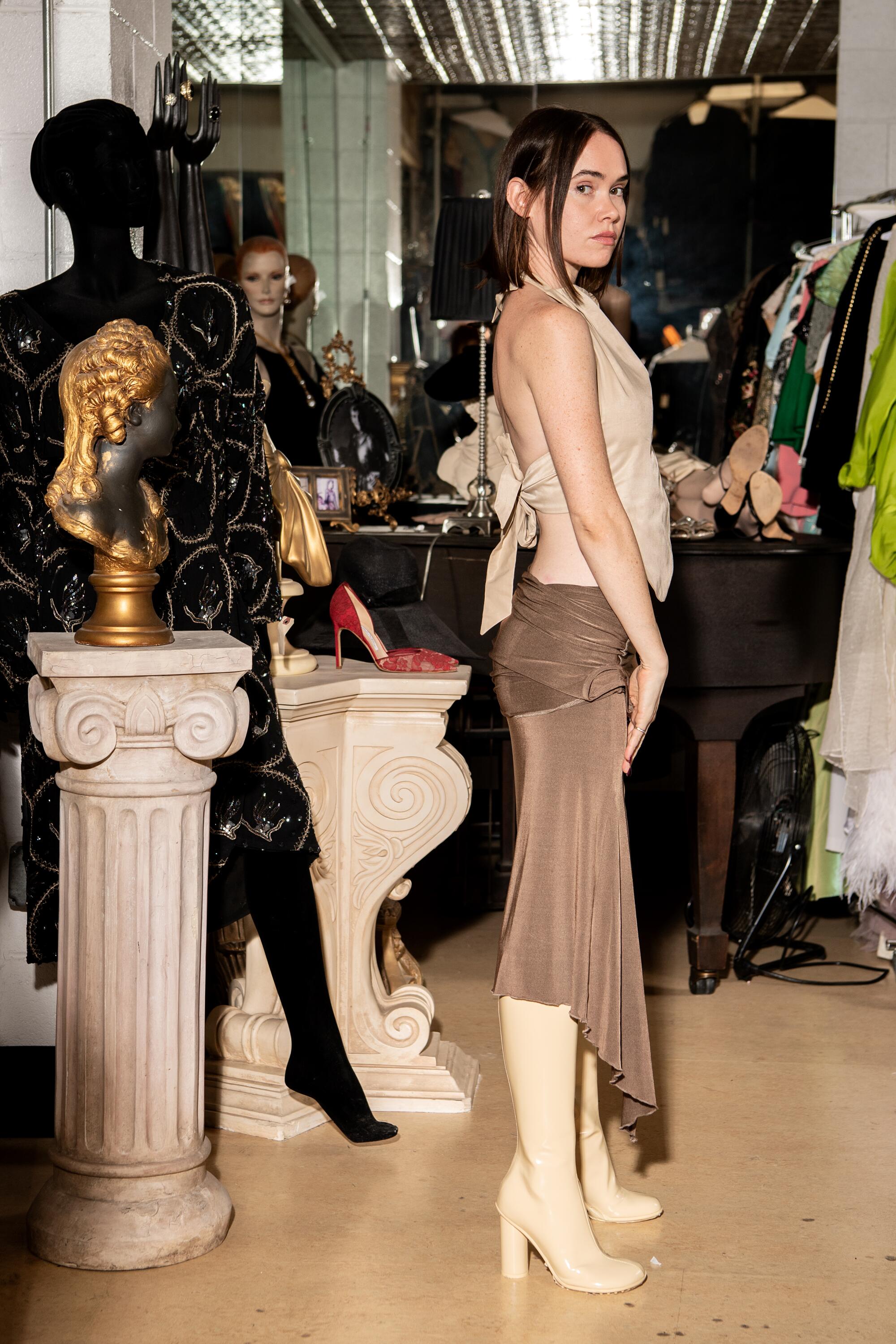
Sophia Haydon-Khan: How would you describe your personal style?
Tess Herbert: Right now I’m in my chic era. I’ve grown up a bit. I mainly wear vintage designers from the ‘90s or early millennium — that’s my favorite time in fashion. I never wear dresses; I just wear tops and bottoms or skirts and tops. I like to be comfortable and contemporary and go from day to night. I’m probably a little more on the dressed-up end of things. I’ll never under-dress.
SHK: How would you describe the day to night shift? What does that mean to you?
TH: I often wear an outfit that is probably too dressed up for the day and good for the night so I can transition. You can also really change an outfit with a bag and a shoe — put a casual shoe on and it’s a casual outfit, or you can dress it up with a shoe and a tiny fab bag. It’s a totally different look. When I was living in New York, I used to have to go from day to night every day, so I just got used to dressing like that. But if no one sees me, I’m in Brandy Melville. My L.A. life is very Brandy Melville.
From her own fits to dreamy styles for Sabrina Claudio and Tinashe, the L.A.-based stylist elevates modern trends with a feminine touch.
SHK: You said that you used to have more playful looks and you’ve moved into something more chic. Has that mirrored anything that has evolved in your own life?
TH: I moved to London last year and I’ve mainly been there since then. I think, wherever you go, your style changes and I got into some London vibe that made me want to seem more put together and more interested in shapes. I used to have a New York sensibility where I’d have an element of irony to my outfit, which I don’t really have anymore. Now I’m in my 30s and out of my 20s and experiencing a shift that comes with maturity that is reflected in how you dress.
SHK: Tell me about your styling for celebrity artists like Phoebe Bridgers, Olivia Rodrigo and Teyana Taylor. I noticed you tend to lean away from their typical styling and put them in looks they haven’t been styled in — is that intentional?
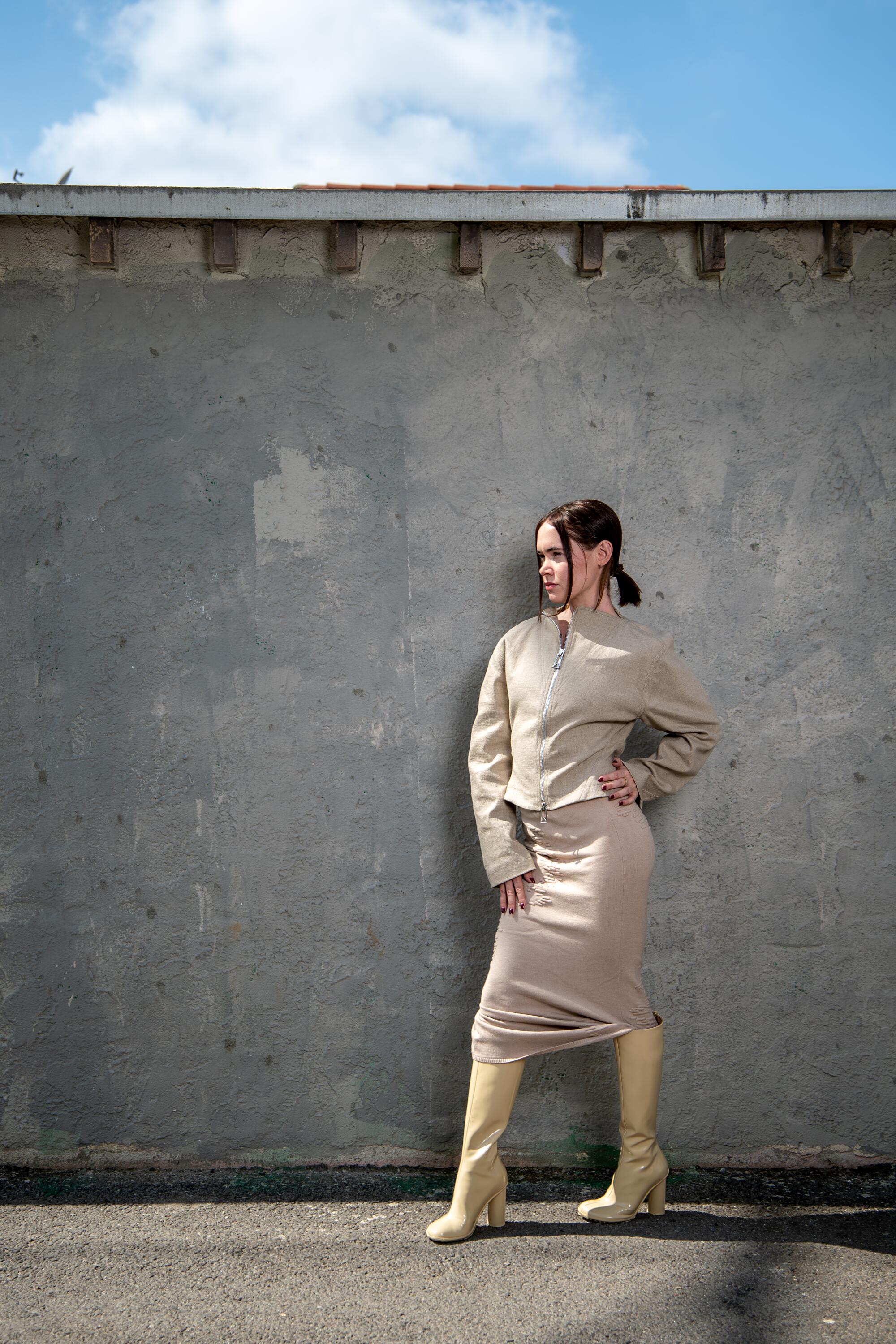
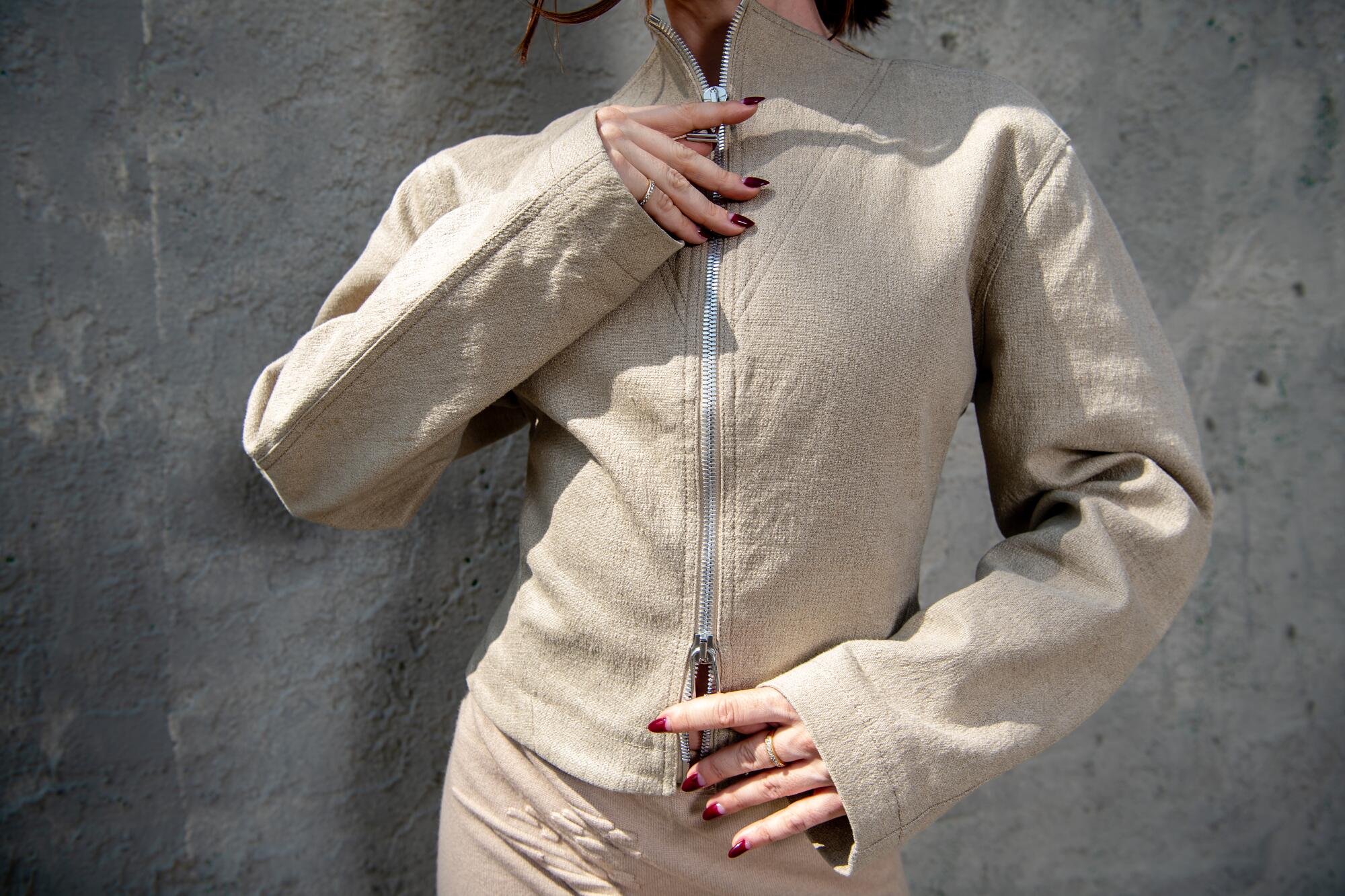
TH: I try to push as much as I can with artists. I have a vision for all my artists based on their music, their attitude and the aesthetic they’ve already presented to the world. With Phoebe I said, ‘she should be all in black, Junya Watanabe, let’s do her f—ed up, using Japanese designers that make it almost cutesy but evil. With Olivia, when I would style her, it made me think of what I wanted to wear at 13. I would put her in the stuff I was wearing back then and imagine myself as a teen.
SHK: Does that push and dissonance elicit something new from these celebrities?
TH: I think it puts them in that power. People can teach you the way that you want to dress — especially with Phoebe, I exposed her to more high fashion, believing she could still be herself and pull off these ultra glamorous or ultra fashionable looks. I think it really empowered her and gave something more to her editorials and to her press. But I think with celebrities it is hard because you’re never going to fully be able to express yourself as a stylist because they have their own idea. It’s hard to find the best situation where you’re working with artists that speak the exact same language.
SHK: I’m interested in the short film, “Salacia,” by artist and activist Tourmaline, that you designed costumes for and that ended up in MoMA’s collection. Could you tell me a little bit about the design that went into those costumes?
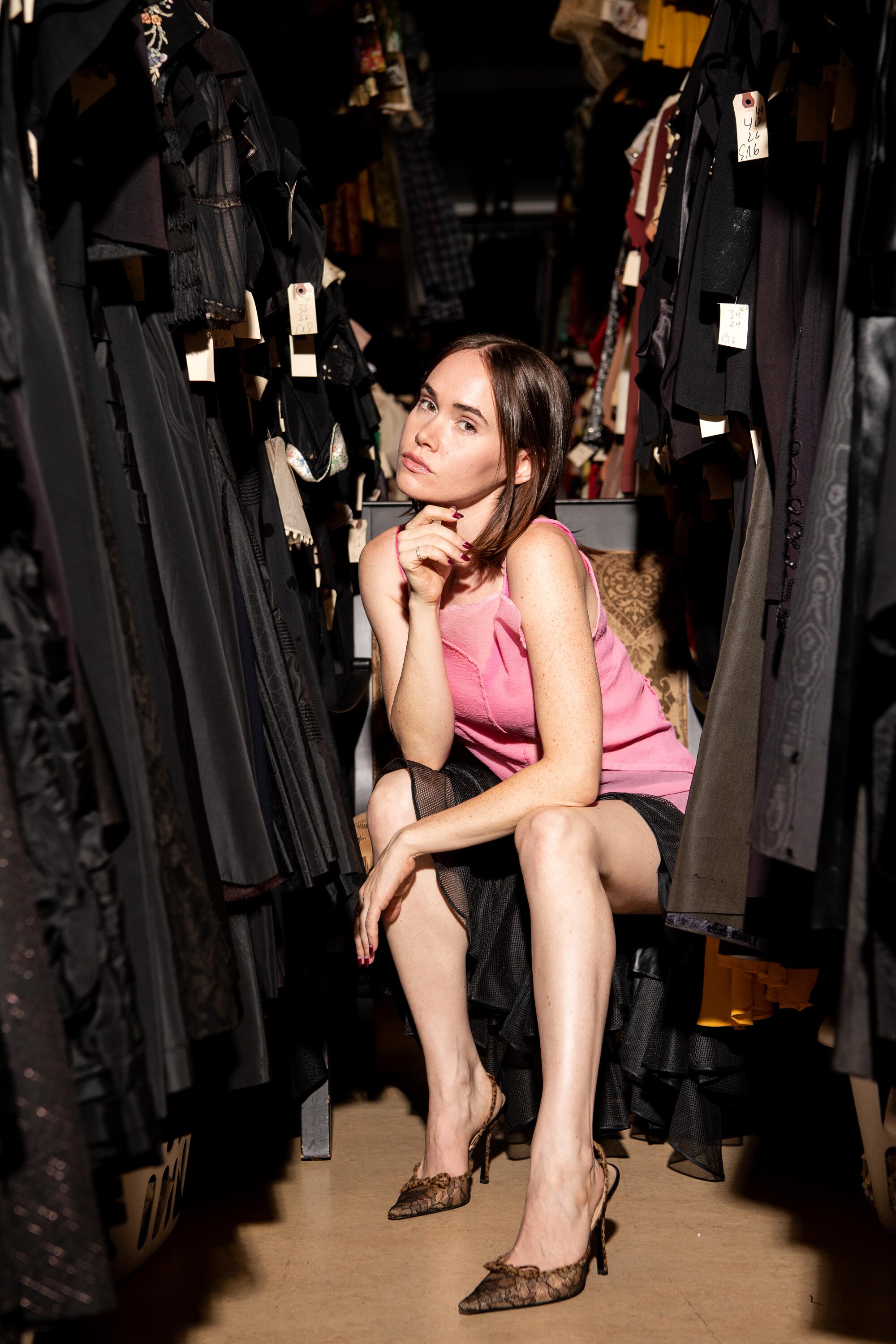
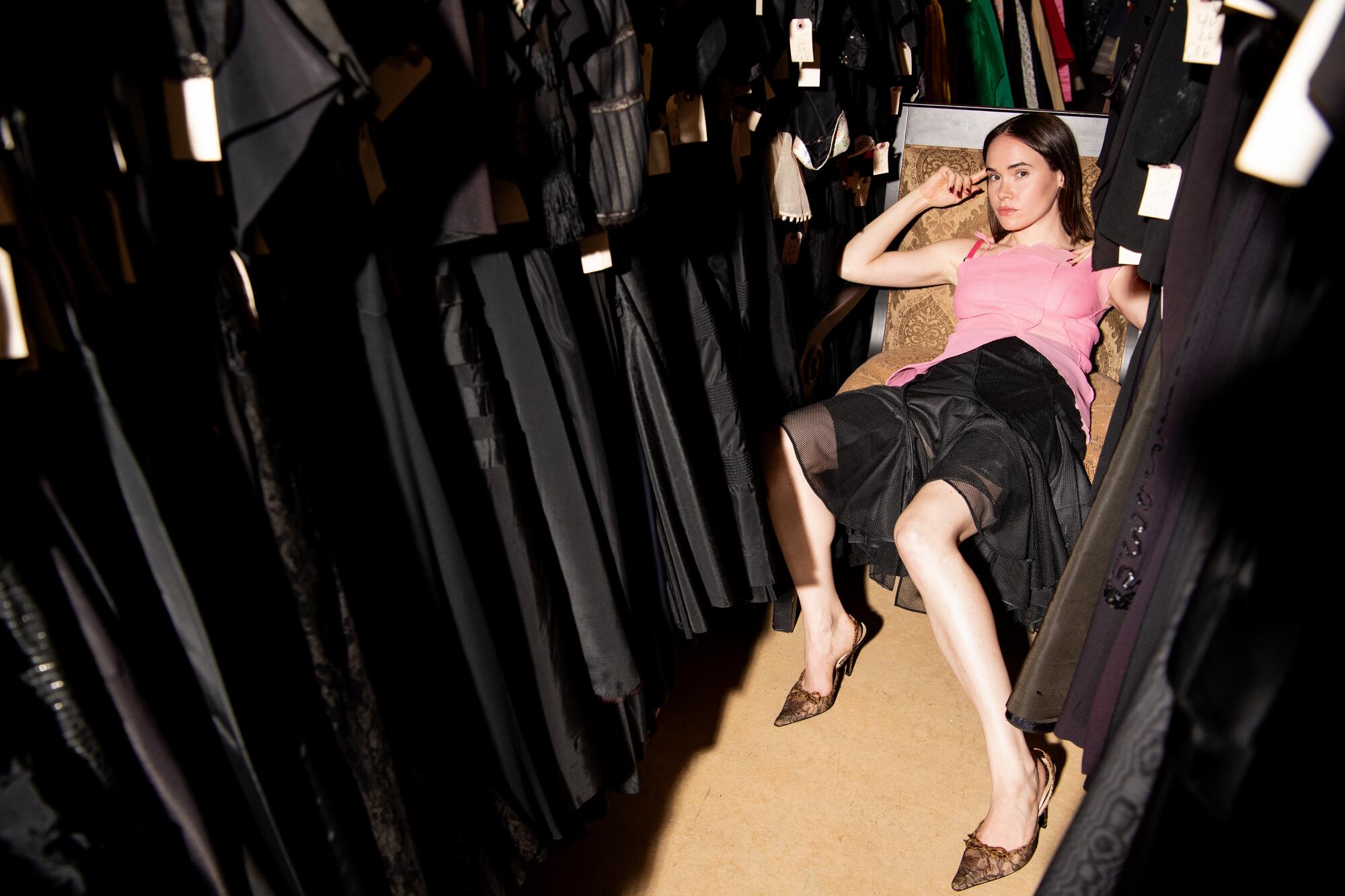
TH: It was a play on 17th-century attire so I was able to be creative with that. The film had so many lives of its own — MoMA acquired it, the Tate acquired it, it was in the Venice Biennale, it blew up. There were a few years where I was doing a lot of art projects with artists who were my friends. That was fun for me to live out my costume design fantasies because I’m really interested in historical dress. I nerded out on references and used all these elements that I didn’t have the opportunity to [use] before. But art styling is such a small field, so it was a time and a place where I was really immersed in that.
SHK: As a speculative piece, what creative liberties did you take with the subject matter and with the costumes?
TH: I took a lot of liberties because I was told by Tourmaline to do whatever I wanted and that it didn’t have to be historically accurate. Because there was an element of ancestral magic in the film and for the main character, I tied other fairytale costume concepts within her 17th century linen and lace look. There were elements that were fantastical and based on the Renaissance period. I tried to give her costume those elements, whether it be magic, like a pouch on her waist.
SHK: Among the clients you style a lot of them are artists and writers. Do you view styling as an artistic or intellectual pursuit?
The L.A. stylist who has worked with Jessica Alba, Kate Hudson, Yalitza Aparicio and Goldie Hawn says her practice is about searching for a “vibe,” an “identity” — whatever it is that makes people human.
TH: Artistic and intellectual. Everyone’s expressing who they are through their dress, even if they’re not conscious of it. It’s a culmination of who you are as a human. Even if you’re not into fashion, it still is. Because it’s such a prominent thing on us. It takes up so much space, we’re constantly confronted with it from everyone.
SHK: Tell me about your work with Barragán. What drew you to their avant-garde style?
TH: I think it was during his first collection or his second collection that I approached him and said, ‘I really want to shoot your collection as a campaign.’ It was about underwater creatures, and it was so beautiful — nothing like I’d ever seen. From that point onwards, I started working with the brand and styling the collections for many years. With my fashion background and [Barragán’s] architecture background, we collaborated really nicely.
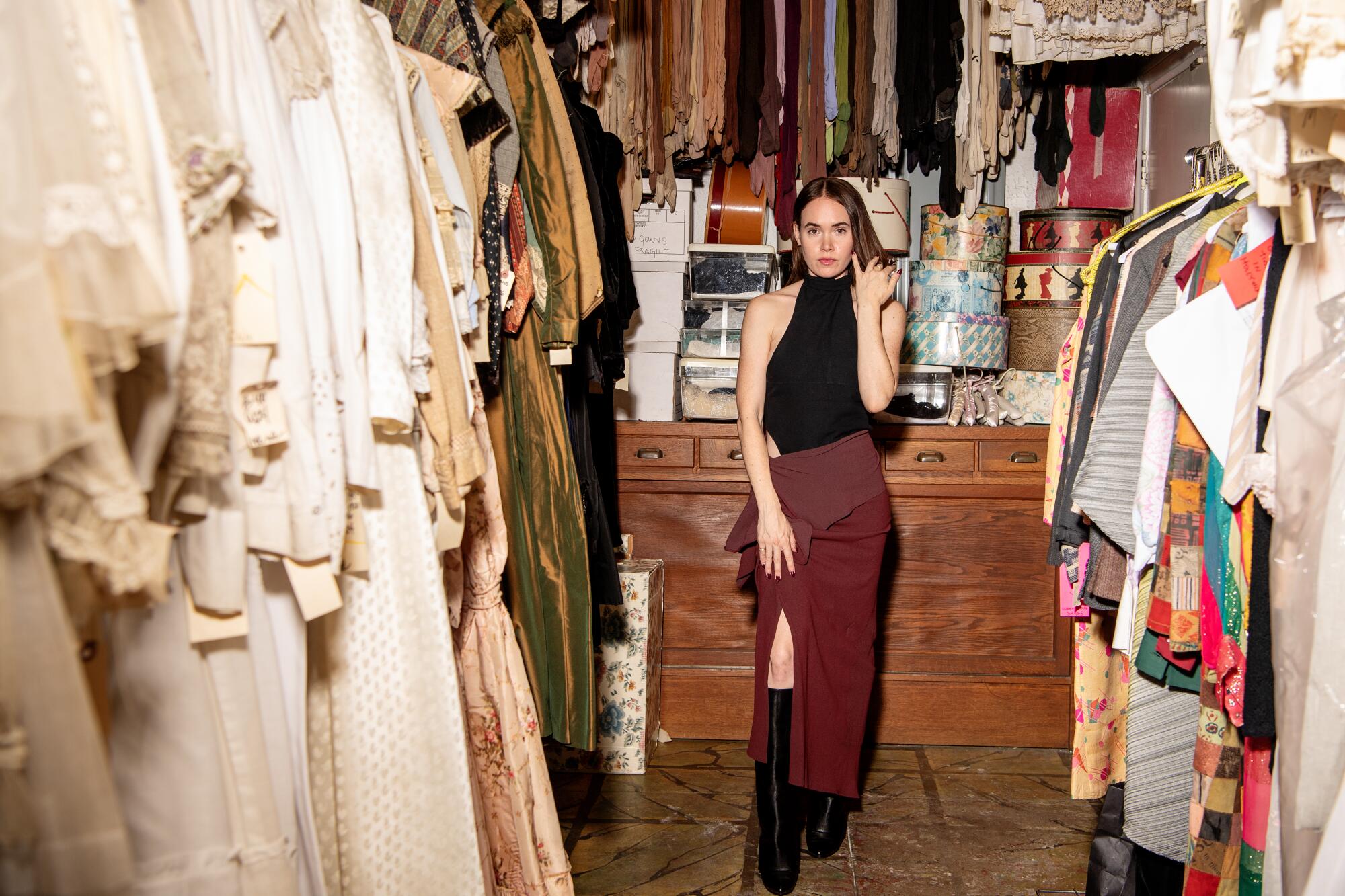
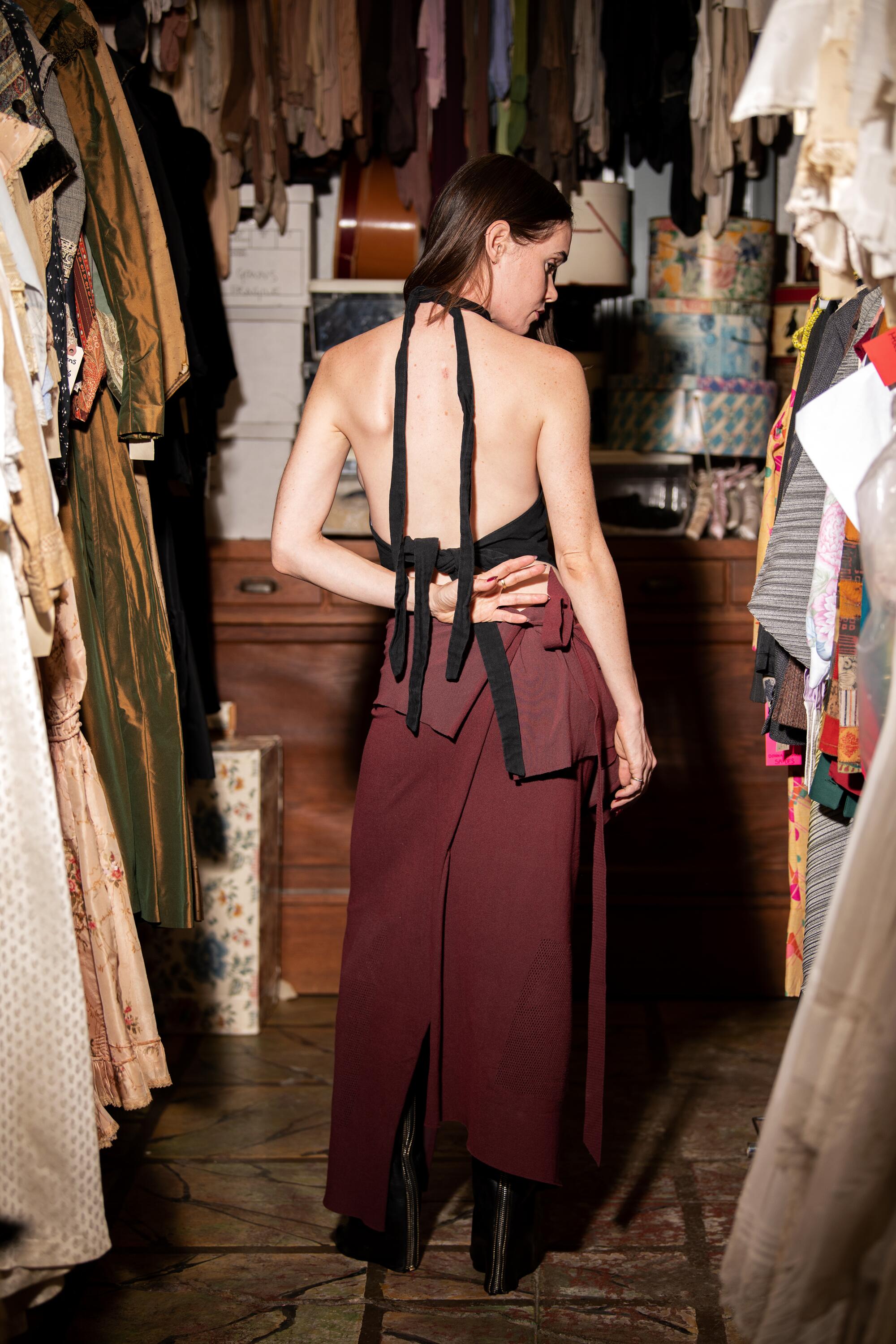
We did lots of guerilla shooting. It was such a big ‘f— you’ — it’s so gorgeous and beautifully done but there was this anti-establishment energy. Rebelling against white supremacy and how unfair the fashion industry can be and how it doesn’t always value people who are the most talented.
SHK: What makes you most inspired to create?
TH: I still have a deep desire to know as much as I can about fashion. Everything that’s going on with it right now and everything that’s gone on with it in the past. My first thought is always to observe how people are dressed around me and what access to clothes different cities have. It’s a desire that does not burn out.
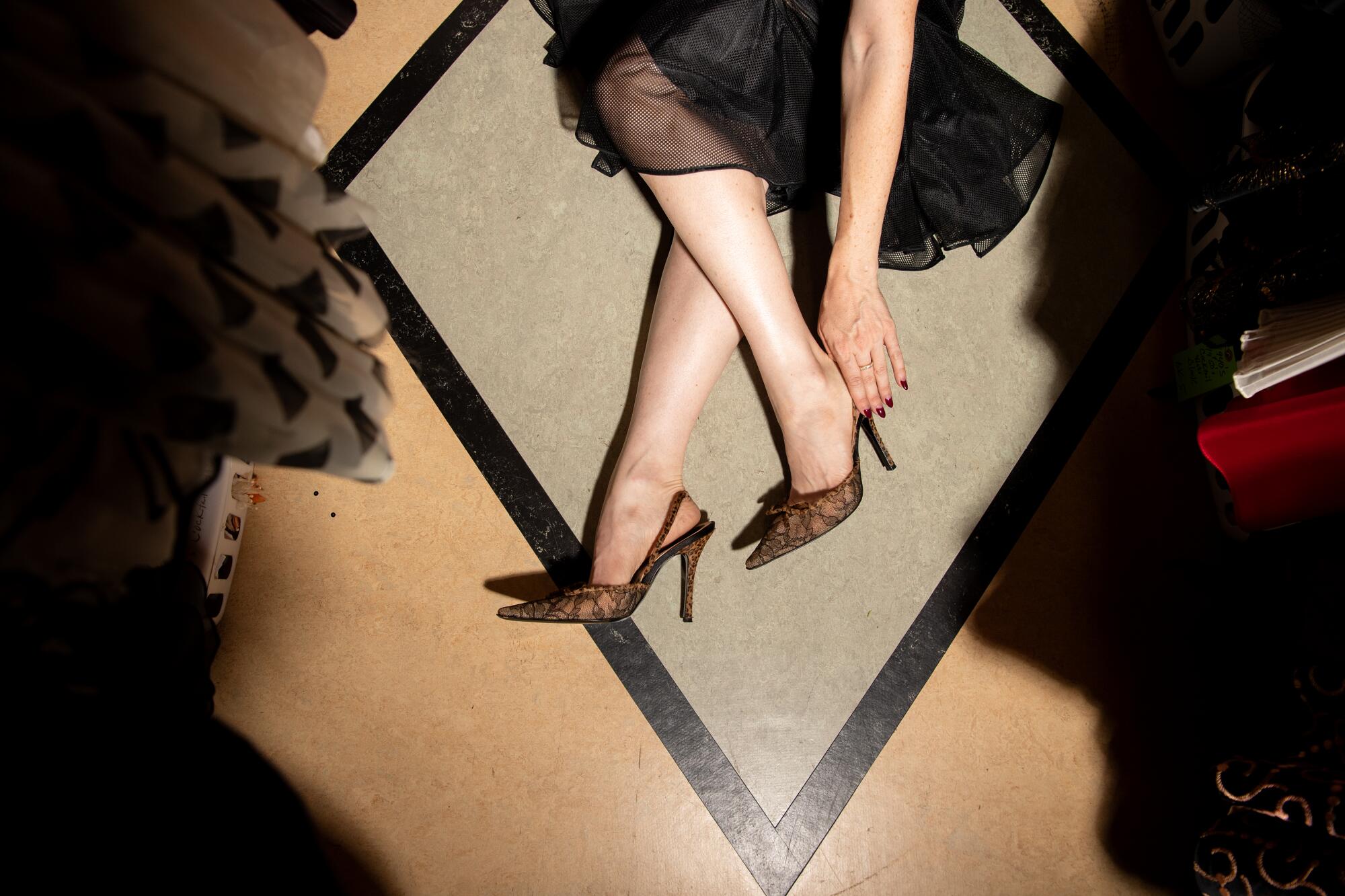
Sophia Haydon-Khan was a 2023 intern with Image magazine at the Los Angeles Times. She studies government at Smith College, where she writes for Smith’s student newspaper, the Sophian, and serves as arts and culture co-editor. She has also written for Northeastern University’s the Huntington News and Tastemakers Magazine.
